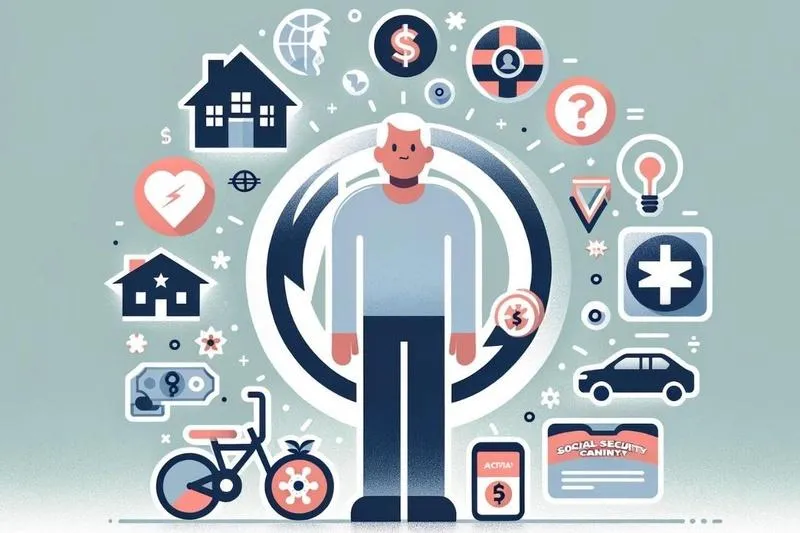
The Changing American Population
This year, there are more people turning 65 years old in America than at any other time in history. Baby Boomers, those born between 1946 and 1964, are now between the ages of 60 and 78, and they are turning 65 at a rate of 11,300 per day. This population dominance is projected to continue for several more years, and baby boomers will maintain their large influence on the economy for decades.

Baby boomers are nearly tied for the second largest demographic group in America, with the millennial generation (born between 1981 and 1996) representing the single largest demographic group.

There are several factors that baby boomers represent as both favorable and a risk for the economy.
BABY BOOMER FAVORABLE ECONOMIC INFLUENCE
1. Most baby boomers are the wealthiest demographic group in America
Most baby boomers are in stable and sustainable financial condition. Most own their own home with either no or a small mortgage balance. Some baby boomers either owned their own business or still do. Many have benefited from the real estate rally since the late 1990s by owning additional property, including residential rental or commercial real estate, that has appreciated well over the years.

2. Baby boomers have a sustainable and stable income
Although many baby boomers don't have pension plans as their parents did, they have savings in personal accounts and 401k retirement plans. Unlike fixed monthly benefits from pension and social security plans that can decline upon the death of the wage earner spouse, 401k accounts transfer untaxed and without any adjustments in value to the surviving spouse, who can choose when and amount to take withdrawals. Even though new IRS rules require a minimum amount withdrawn each year after turning 73, the amount is well below what would be necessary to deplete the account by age expectancy.

It is interesting that even though younger generations must realize that their baby boomer parents' financial condition would be greatly impaired if it wasn't for their 401k savings, younger generations are not contributing to their own 401k accounts. This is an article for a future Weekly Brief, but younger generational workers need to realize that pensions will probably not ever be offered by companies again, and social security is questionable in its ability to pay monthly benefits 30 to 50 years from now. The younger generation's primary source of retirement benefits will most likely be their own savings and 401k account.
While I was at Best Buy this week, I spoke to the Geek Squad employee while he was working on my computer. I asked if he saved in the company's 401k and if Best Buy had a stock purchase plan (most public companies do). He didn't know about either plan and was not participating. Most companies offer 401k plans and typically match additional amounts into the employee's retirement account that, for some companies, match as much as 100% of what the employee contributes. If you are a parent with working-age kids, tell them to find out about their employer's 401k plan and get started saving if they have not already. Hopefully, the low participation rate in company 401k accounts with younger generations will start to increase soon.
3. Baby boomers are healthier than their parents
A Census Bureau report titled "An Aging World," co-authored by Wan He, projected that life expectancy worldwide for 65-year-olds went from 11.9 years in 1900 – 1902 to 19.1 years in 2010. According to John Elfein in his December 12, 2023 article in Statista, American men are projected to live another 17 more years on average and women another 19.7 years. Many of today's baby boomers are actively engaged in part-time work, travel, new hobbies, or being available for their kids and grandkids. Many baby boomers are regulars to the fitness gym or participate in various sports or exercises (pickleball, anyone?).
4. Baby boomers have more to spend than any other demographic group
Many baby boomers not only have active lifestyles but also have financial resources to spend. Their spending contributes to consumer spending, which represents 66% of the US economy. Although baby boomers are wealthier than their counterparts years ago, a large portion of their wealth is the result of rising housing prices and their equity. Many baby boomers were fortunate to refinance their homes these past several years with fixed rates below 4%, which has provided financial stability and predictability on probably their largest expense item.
Although the equity in their homes is real, the funds are only accessible by selling or refinancing. Many late baby boomers have discovered that most lenders do not offer refinancing without W-2 income or after turning certain ages. I have had many retired clients with substantial net worths and passive income from investments unable to qualify for a loan for either a primary residence or investment property due to lack of W-2 income.

BABY BOOMER RISK FOR US ECONOMY
1. Declining spousal benefits
Even though many married baby boomers are in stable financial condition, the death of the former wage-earner spouse can have a significant impact on the surviving spouse. Although fewer retirees have pensions, those who do will be surprised to learn that at the death of the former wage earner, the surviving spousal benefit can be reduced by as much as 50%. This may also be true for social security benefits if the surviving spouse does not meet the minimum 40 quarters of contributions to social security. If both spouses are receiving social security benefits, at the death of one of the spouses, the surviving spouse will continue to receive their benefit, but typically, the benefit of the deceased spouse will be reduced.
Reducing or losing one or two of the retirement income sources can significantly impact the financial status of the surviving spouse. The challenge of a potential decline in retirement income is compounded by rising medical costs or the need for long-term care. A lifetime of savings can disappear in a few years of paying for health care.

2. Running out of Money
The good news for baby boomers is their life expectancy is increasing. Unfortunately, many may not be able to afford to live a long and healthy life. In 2020, the Alliance for Lifetime Income Study reported that 60% of retirees depend on Social Security as their main source of income. US Census Bureau reported that 50% of those 55 to 66 years of age have no savings whatsoever. This group is no doubt working and able to make ends meet with their income. But at some time, they will not be able to work, and with no savings, their financial condition is critical.
3. Declining Social Security Trust
Even though current baby boomers are not concerned about receiving their social security benefits, this is not true for future generations. For decades, the ratio of the number of employees contributing to social security vs those receiving benefits has been declining. As in any Ponzi scheme, the key to keeping everyone happy is to have at least the same amount or more of new deposit flow as your distributions. The Social Security Act was signed by President Roosevelt on August 14, 1935, and has been amended many times since 1935 to include benefits to non-working spouses, disability coverage, and payroll withholding that was added to the IRS Code and renamed as Federal Insurance Contributions Act (FICA).The most critical aspect of the future of the Social Security program is the declining number of contributors to beneficiaries. As late as 1960, there were 4+ contributors to every beneficiary. That is projected to be reduced by almost 50% to about 2.2 contributors for every beneficiary by 2043.

The issue is how future administrations will fund the shrinking Social Security Trust balance. Most likely, it will be a combination of changing benefit terms such as eligibility and increasing payroll FICA withholding.

Taxes are the number one challenge to building wealth. Higher taxes mean less take-home pay. Future workers may experience pay cuts with both higher FICA withholding and increasing state and federal government taxes to plug trillions of dollars in budget deficits.
4. Changing demographics
Whenever societies have dramatic changes in their population, there are ramifications. In 1974, the baby boomers were the powerhouse for companies due to the sheer number of qualified and experienced workers. In addition, due to the slower growth of the US population in prior years, baby boomers were the new leaders in companies with less dependency on retiring employees who were fewer in number.

However, by 2030, baby boomers who will be entering their twilight years will still represent about 35% of the potential workforce. Many baby boomers are still engaged in some form of business, and the current younger workforce is still dependent on their experience and knowledge. I have many clients who retired and were rehired as consultants by their former employers due to the shortage of younger employees with similar experience and knowledge.

WHAT DOES IT MEAN TO ME?
If you are a baby boomer….congratulations! Your best years may still be ahead of you, with hopefully lots of adventures in travel and experiences with family and friends. The slow-moving demographic trends are issues current employers are working through with strategic plans to train and promote younger employees into leadership. The economy will continue to benefit from the wealth of baby boomers as they enjoy their savings going on trips, buying stuff for grandkids, and many other activities during their retirement.
The near-term US economy is not in harm's way as baby boomers age. However, the efficiency of wealth transfer from baby boomers to younger generations will determine the future trajectory of the economy. The risk for future economic growth will be dependent on how younger generations spend their inherited wealth. If the younger generations focus their spending on depreciating assets (toys), poor investing strategies, or simply to pay for enhanced lifestyles, their future and the future growth of the US economy may be in jeopardy. If you are a baby boomer, this is a terrific time to educate your kids and grandkids on work ethics, investing strategies, and building wealth that can help them plan for their future.
Let us know what you think and any suggestions you may have on this topic. We welcome your feedback. If you have any questions about your finances or investments, please give us a call or send an email, as we welcome the opportunity to assist you and your family.
CONTACT
Check the background of your financial professional on FINRA's BrokerCheck.
The content is developed from sources believed to be providing accurate information. The information in this material is not intended as tax or legal advice. Please consult legal or tax professionals for specific information regarding your individual situation. The opinions expressed and material provided are for general information, and should not be considered a solicitation for the purchase or sale of any security.
We take protecting your data and privacy very seriously. As of January 1, 2020 the California Consumer Privacy Act (CCPA) suggests the following link as an extra measure to safeguard your data: Do not sell my personal information.
The information on this website is the opinion of Up Capital Management and does not constitute investment advice or an offer to invest or to provide management services. Before purchasing any investment, a prospective investor should consult with its own investment, accounting, legal, and tax advisers to evaluate independently the risks, consequences, and suitability of any investment.
Copyright 2024 | Privacy Policy | Terms & Conditions

